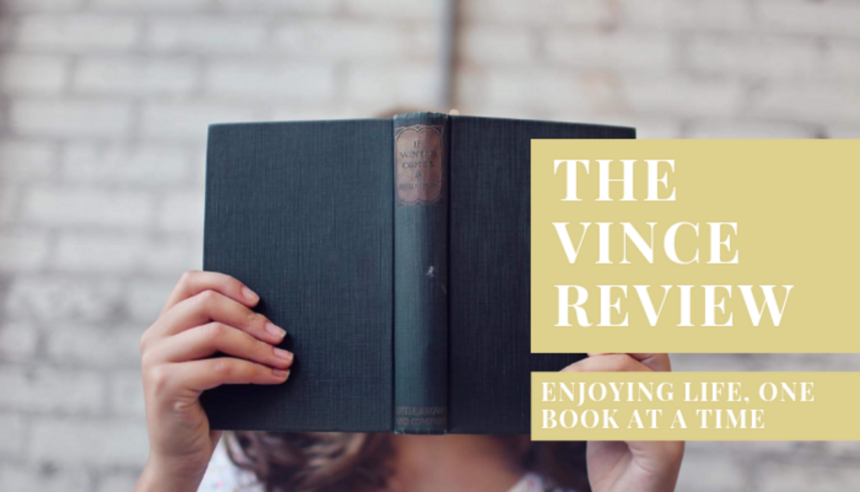Tuesday, February 27, 2018
'Breakfast at Tiffany's' by Truman Capote
In this seductive, wistful masterpiece, Truman Capote created a woman whose name has entered the American idiom and whose style is a part of the literary landscape. Holly Golightly knows that nothing bad can ever happen to you at Tiffany's; her poignancy, wit, and naïveté continue to charm.
MY THOUGHTS:
This is my choice for the 20th century classic category of the 2018 Back to the Classics Challenge.
It's set in a New York apartment block during the second World War. A young aspiring writer finds himself falling for a mystery girl who lives on the floor above his. But the charismatic Holly Golightly has secrets, two of which are brought to light during the course of the novel. And they are clearly intended to make the reader say, 'Whoa!'
Holly is THE character around which the book revolves. Others love or hate her, but nobody is indifferent. She's the sort of person who will impose on somebody, then get prickly when he shows a subsequent interest in her background. Others may resent that, but our smitten young narrator simply takes it as a challenge. To me,Truman Capote's writing style seems more noteworthy than the story itself. His sparing prose has plenty of clever imagery, and a skillful way of making us sense things that aren't stated outright.
For example, Holly is all about colour and movement. We deduce this from the way she dresses, her apartment's 'fly-by-night' look, and simply what she's written on her card, 'Holiday Golightly, travelling.' It all gives the impression that she's not static, but fluid verging on restless. And it's reinforced by a number of casual references all through, such as her avoidance of the zoo because she hates to see creatures caged. Capote pulls this off with a minimum of words, because the whole story is over in just 100 pages.
Some of the minor characters are summed up in one or two revealing sentences, or even just a phrase. Rusty Trawler, her paunchy, wealthy middle-aged admirer, is a 'preserved infant.' The Brazilian Jose seems as out of place in their company as 'a violin in a jazz band.' And Mag Wildwood is a 'triumph over ugliness' since she accentuates her supposed defects rather than hiding them. It's easy to admire the way Capote saves space on descriptions, yet still makes his point.
The title may be a bit misleading. I think there's something alluring about the mention of food on a cover. Maybe it gives the impression there'll be some homely warmth. Yet nobody in the novel has a meal at Tiffany's Department Store. Holly simply mentions it in passing as one of her aspirations.
But even that turns out to be one of Capote's quick, subtle hints about the flip sides of her character, especially when snippets of her background are revealed. Holly is a girl who has the drive to leave an undesirable situation in search of something better, and the simple opulence of a department store during the war, with luxuries she can't afford, is enough to be her guiding star. I think we're meant to think that she has plenty of drive and gumption, but also naive idealism.
It's one of those stories where the movie possibly surpasses the fame of the book, because the lead role is well cast. I've never even seen it, but it's hard not to picture Audrey Hepburn's pixie face and little black dress as I read, just through taking on the hype over the years. It sounds like Hepburn must have nailed the dual sides of Holly's character; coming across both determined and delicate just by being herself. Holly Golightly could be a hardened criminal, yet she might simply be an innocent girl, dragged into something over her head. I'm sure Hepburn's is the name that springs instantly to most people's minds when someone says, 'Breakfast at Tiffany's' even more than the author's. I put it to the test, and my family had never heard of Truman Capote.
Overall, I wasn't crazy about the plot. My favourite stories are usually longer, not so up-in-the-air, and not focused on just one character. 'Fred' reveals nothing about himself at all. Although he keeps repeating that it's not really about him, it might have been nice to at least know his name. As for Holly, well meh, I didn't get fond enough of the mystery girl to care much what happened to her when she made her secret disappearance. She's always condescending to the narrator, which grated on me. I wonder if I'm in the minority when I say I found the book pretty forgettable on the whole. The shortness is all that saved it from two stars, since it was too short to put aside. Sure, Capote's clever writing was good, but since he didn't intrigue me with his characters, then so what? If you want to give it a try, at least it'll be over quickly if you don't like it. I think the best character is the orange cat.
🌟🌟🌟
Friday, February 16, 2018
Taking a short break for moving
I'll be back blogging as soon as I can. Meanwhile, here's what we'll be occupied with for the next week or so. This is hard to believe, surrounded by boxes in our old home with cupboards empty, but next time you hear from me, we should be settled into our brand new home.
Looking forward to seeing you on the other side of the chaos here!
Looking forward to seeing you on the other side of the chaos here!
Tuesday, February 13, 2018
'Little House on the Prairie' by Laura Ingalls Wilder
This year, I'm hosting a read-along of all of the Little House on the Prairie Books by Laura Ingalls Wilder, which you'll find here. We'd love you to read along and share your thoughts, if you feel so inclined. I haven't included a sign-up sheet of any sort, but kept it all very informal. Here we're up to the month of February.
* * *
The adventures continue for Laura Ingalls and her family as they leave their little house in the Big Woods of Wisconsin and set out for the big skies of the Kansas Territory. They travel for many days in their covered wagon until they find the best spot to build their house. Soon they are planting and plowing, hunting wild ducks and turkeys, and gathering grass for their cows. Just when they begin to feel settled, they are caught in the middle of a dangerous conflict.
MY THOUGHTS:
It's Laura's second book, in which she writes about another year in the life of her family. They are off in their covered wagon to settle in Indian Country, because the Big Woods are now too crowded for Pa. He's lured by the promise of a treeless, level country with thick wildlife, and she describes the fertile openness and solitude of the wide prairie beautifully. Their small family unit gets along well together, savouring the little things. When Ma presses each loaf of cornbread flat for the coals, Pa says he wants no other seasoning than her hand print :) And in return, she calls the comfort of the bed and rocking chair he makes her, 'almost sinful.' Getting squares of glass for their windows is cause for a family celebration, and the girls' joy knows no bounds when they get tin cups, candy canes, little cakes and coins for Christmas.
However, Laura continues her own private quest to match the perfection of Mary. When she feels shown-up, her natural instinct is still to lash out with a slap, but she's learned that's strictly forbidden. (See Little House in the Big Woods.) She decides to muster her willpower to compete instead, but it's a losing battle, because Mary has set the bar so high. For all her good intentions, poor Laura crashes and burns at times, such as the moment she yearns for Pa to bring her a little, black-eyed papoose.
But chinks in Mary's exemplary exterior show through in this book, proving that she's only human like the rest of us. A great example is her tendency to freeze up and become helpless whenever she's scared. Poor Mary.
 Heroes show up in the unlikeliest, most remote spots, including men who saved their lives outright. There's Dr Tan, the negro doctor who cured them from malaria, and Soldat du Chene, the tall, French-speaking Indian from the Osage tribe who talked thousands of others out of murdering the settlers. Pa himself always rises to the occasion, such as dragging unconscious Mr Scott from the bottom of the partially completed well. (Perhaps sinking to the occasion is more accurate in that example.) And one of my favourite heroes is Mr Edwards, the bachelor and legend who cared so much about making Christmas special for two little girls that he risked his life to swim across a raging creek to bring them presents from Santa.
Heroes show up in the unlikeliest, most remote spots, including men who saved their lives outright. There's Dr Tan, the negro doctor who cured them from malaria, and Soldat du Chene, the tall, French-speaking Indian from the Osage tribe who talked thousands of others out of murdering the settlers. Pa himself always rises to the occasion, such as dragging unconscious Mr Scott from the bottom of the partially completed well. (Perhaps sinking to the occasion is more accurate in that example.) And one of my favourite heroes is Mr Edwards, the bachelor and legend who cared so much about making Christmas special for two little girls that he risked his life to swim across a raging creek to bring them presents from Santa.But although it's another beautiful family tale, modern readers can't ignore the elephant in the room. The Ingalls family was involved in something pretty dodgy. The government had promised to clear the Indians out of their ancestral land to open it up for settlers, and Pa put up his hand to say, 'Yes please!' Arguably what he should have said was, 'No thanks, being part of something so unethical would hang heavily on my conscience for the rest of my life.'
He does come across as respectful of their culture and optimistic that they could all get along. He probably reasoned that they were all human, but that's like goldfish setting their aquarium among sharks because they're all fish, or canaries nesting among eagles because they're all birds. To imagine that two distinct communities with alien values and poles-apart cognitive habits can suddenly live side by side is a recipe for disaster. Even though Pa is careful to treat them courteously, there's always a sense that he's just waiting to be rid of them. 'Indians are always moved on,' he says. Or, 'They should have the sense to know when they're licked.'
I wonder if he ever considered how he'd feel if the Indians were given a mandate to lob in the middle of the Big Woods of Wisconsin and start pushing his extended family back. But failure to consider somebody else's former claim was characteristic of many nineteenth century settlers.
The voice of westernisation may be best expressed by their neighbour Mrs Scott. 'They won't do anything with the country themselves but roam around in it. It belongs to folks that'll farm it. That's only common sense and justice.' Even her assumption that farming is better for land over time than leaving it in its lush natural state is pure colonialism. It's easy to see why the Native Americans were incensed by this form of 'justice.'
So there's an ominous thread running through the whole story, all because the white settlers didn't 'Do unto others', although it never occurred to them that they should. The Ingalls' are living in the land of their fondest dreams, but have to put up with an Indian path running close by their house. Poor Jack the bulldog has to be permanently chained to the house, and Ma must get used to interlopers casually wandering into her home to steal whatever they please. Keeping important supplies in a padlocked cupboard is just a band-aid solution for the deeper, more sinister problem. There's always a sense that the uneasy truce won't last forever.
How frightening it was when the Indians' antagonism reached boiling point. The vulnerable Ingalls family sat in their tiny house surrounded by savage war cries, knowing full well how defenseless they'd be against a crowd of warriors bent on massacre. Six-year-old Laura remembered it like this. 'A nightmare is not so terrible as that night was. A nightmare is only a dream, and when it is worst you wake up. But this was real and Laura could not wake up.' She, Mary and Carrie would have been the most innocent victims had the worst occurred, as they were brought unwittingly to live there by the parents they trusted.
My heart ached for the terrible blow inflicted on Pa and Ma, when they were compelled to leave their nice little home with its freshly planted garden behind. For a man whose mottoes included, 'Better to be safe than sorry,' perhaps moving there in the first place wasn't one of Pa's finest ideas. But I'm sure they were well aware how lucky they were to have escaped with their lives. And their natural optimism is still shown to be firmly intact at the end.
Ma: A whole year gone, Charles.
Pa: What's a year amount to? We have all the time there is.
Next up will be Farmer Boy.
🌟🌟🌟🌟½
Wednesday, February 7, 2018
'Children of the New Forest' by Captain Frederick Marryat
In The Children of the New Forest, Marryat describes the trials and triumphs of the four Beverley children, orphaned during the English Civil War and forced to take refuge with a poor woodsman in the New Forest. This is the first annotated edition of a great children's classic, which has retained its popularity since 1847.
MY THOUGHTS:
I chose this title to fit into the category called a re-read of your favourite classic, for the 2018 Back to the Classics Challenge. I adored this book when I was in Year 9 at High School. I read it through several times, daydreamed about it, recommended it to others, and even tried to draw pictures of the main characters. But I never read it to my own kids since they strongly objected to the title and cover design. (More about their assumptions here. Throughout this review, I'll share several alternative covers I found, but I'm sure none of them would have impressed my fussy mob any more.) So this was my first read since childhood. It made me a bit nervous, as it's a sad let-down when things don't live up to our rosy memories. But I was relieved. Whew!
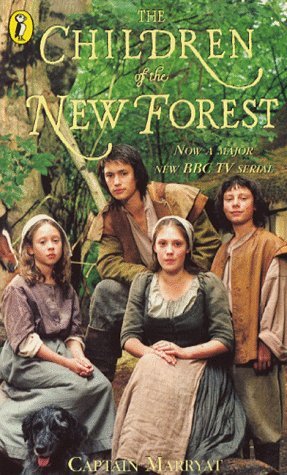 It begins with a huge event that draws us right in. The time period is the English Civil War, and the king's troops, known as the Cavaliers are fighting against Parliament and the supporters of Oliver Cromwell who want to overthrow the monarchy. An old park ranger named Jacob Armitage overhears a plot to burn down a gracious old mansion named Arnwood, where the fugitive King Charles is suspected to be hiding. It was the home of a deceased war hero named Colonel Beverley, whose young children will surely burn to death if nobody intervenes. Jacob sneaks them out that very night, with a plan to bring them up as his own grandchildren. So Edward, Humphrey, Alice and Edith must learn to live a rustic lifestyle and fend for themselves in the New Forest, since Jacob believes it's far too dangerous to reveal their true identities.
It begins with a huge event that draws us right in. The time period is the English Civil War, and the king's troops, known as the Cavaliers are fighting against Parliament and the supporters of Oliver Cromwell who want to overthrow the monarchy. An old park ranger named Jacob Armitage overhears a plot to burn down a gracious old mansion named Arnwood, where the fugitive King Charles is suspected to be hiding. It was the home of a deceased war hero named Colonel Beverley, whose young children will surely burn to death if nobody intervenes. Jacob sneaks them out that very night, with a plan to bring them up as his own grandchildren. So Edward, Humphrey, Alice and Edith must learn to live a rustic lifestyle and fend for themselves in the New Forest, since Jacob believes it's far too dangerous to reveal their true identities.The bulk of the book is all about how they manage to get along after Jacob's death. It includes defending themselves against scoundrels and cutthroats, and concealing their identities when Parliament hijacks the running of the forest, which hurts their royalist hearts. The oldest boy Edward chafes against the lie he's compelled to live, and longs to strike a few blows for the king on his own behalf. It's easy to feel his frustration as he and the others grow into their latter teens.
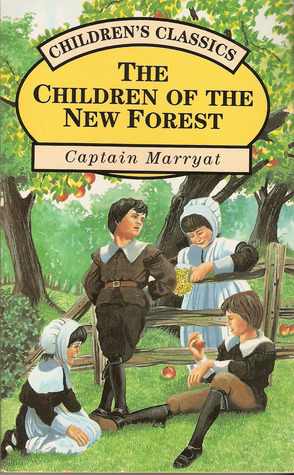 My biggest turn-about is the brother I most admired. When I was a teenager, the restless and adventurous Edward stole my heart. But this time round, I noticed how he seems to walk around with his head in the clouds, dreaming of being a hero, while Humphrey is busy making practical improvements in the short term to keep them all alive. The younger bro seems by far the more intelligent, humble and creative of the pair. He gets ideas from books and improvises with whatever's on hand. In fact, lack of resources is just a fun challenge for him. He revolutionises the cottage, figuring things out from personal observation, trial and error. And above all, he's content to be overshadowed by his brother, and not the sort to be seduced by promises of glory. Humphrey, I've got to say, you're the man!
My biggest turn-about is the brother I most admired. When I was a teenager, the restless and adventurous Edward stole my heart. But this time round, I noticed how he seems to walk around with his head in the clouds, dreaming of being a hero, while Humphrey is busy making practical improvements in the short term to keep them all alive. The younger bro seems by far the more intelligent, humble and creative of the pair. He gets ideas from books and improvises with whatever's on hand. In fact, lack of resources is just a fun challenge for him. He revolutionises the cottage, figuring things out from personal observation, trial and error. And above all, he's content to be overshadowed by his brother, and not the sort to be seduced by promises of glory. Humphrey, I've got to say, you're the man!I was still fond of Edward though, because in all his crusader's zeal and getting people's backs up, he's so human. A couple of other reviewers commented that he's a bit of an idiot at times, which is fair enough, since even his best friends agreed. They expressed it a bit less bluntly though.
'You have been more bold than prudent, Edward.'
Or, 'For these times, you are much too frank and impetuous. This is not the time for people to give vent to their feelings and opinions.'
Or, 'Do you not see you do your cause more harm than good?'
Or, 'Be no longer rash and careless in avowing your opinion.'
In Edward's defense though, he isn't arrogant, and is quick to recognise wise advice and take it on board, even when it comes from younger siblings or men supposedly on the other side of the political spectrum. It's written so that even if you think he's an idiot, he grows on you, and you still want the best for him. (And you can't go past the girl he falls in love with for foolishness, notably in a decision she makes towards the end. I felt like shaking her. But she's a product of her time.)
A couple of other characters they met along the way were among my favourites. The kids accidentally trap a gypsy boy named Pablo, who proves to be a staunch friend and honorary family member, and adds comic relief with his matter-of-fact comments and occasional efforts to shirk intense labour. But one of the best characters by far is Mr Heatherstone, the Parliamentarian who's been appointed superintendant of the forest. Edward and the others must learn to trust him as a friend, even though he presents as an enemy. But Heatherstone is playing a most daring and clever double agent game. It's worthy of Severus Snape, and he grows really fond of Edward as a bonus :)
 I noticed that some of the most critical reviewers dissed this book based on 21st century ethics, which we could hardly expect an author from Captain Marryat's era to share. Sure, the girls tend to be sidelined by the boys, and there seems to be a fixed mindset that the quality of a person corresponds with the class into which he's born. ('Edward appeared as he was, a gentleman born, and that could not be concealed under a forester's garb.') Yet I believe it's unfair to label the author as a chauvinist or social snob, when he was probably one of the most open-hearted, generous and liberal thinkers of his time. I think the best way to get the most out of this book is to suspend our modern scruples and approach it as an eye-opening step back in time when people thought differently. Then there's all sorts of treasures to pick up.
I noticed that some of the most critical reviewers dissed this book based on 21st century ethics, which we could hardly expect an author from Captain Marryat's era to share. Sure, the girls tend to be sidelined by the boys, and there seems to be a fixed mindset that the quality of a person corresponds with the class into which he's born. ('Edward appeared as he was, a gentleman born, and that could not be concealed under a forester's garb.') Yet I believe it's unfair to label the author as a chauvinist or social snob, when he was probably one of the most open-hearted, generous and liberal thinkers of his time. I think the best way to get the most out of this book is to suspend our modern scruples and approach it as an eye-opening step back in time when people thought differently. Then there's all sorts of treasures to pick up. The courteousness of everyday speech is a highlight for me. I love it that these teenagers throw around such cool words in normal conversation as importunity, assiduity and inimical, and it flows so naturally without seeming at all forced. Even when they're insulting their enemies or teasing each other, the language is just beautiful. It made me a bit sad for the woeful deterioration of young people's vocabularies. Maybe it takes reading a book like this to show how low it's sunk.
I love the simple faith of their time and place. There was evidently no church service, but Jacob's first thought was, 'I can't teach them much, but I can teach them how to fear God. We must get on how we can, and put our trust in Him who is father to the fatherless.' And the Beverley kids keep up their private devotions after his death, remaining devout in their youthful way, without being overly pious.
 The parts about the four of them adapting to their rural lifestyle are fun, interesting, and arguably the best thing that could have happened to them. Learning to be self-sufficient rather than waited on by servants for all things is a great advantage. For Humphrey and Alice in particular, being self-taught opens up a whole range of fantastic talents they might never have tapped into in their old lives. The lifestyle is described in one place as 'Arcadian.' In our fast-paced digital age, reading about four teens who live a hidden, quiet life, mainly concerned with subsisting adds a perspective that's probably good for us.
The parts about the four of them adapting to their rural lifestyle are fun, interesting, and arguably the best thing that could have happened to them. Learning to be self-sufficient rather than waited on by servants for all things is a great advantage. For Humphrey and Alice in particular, being self-taught opens up a whole range of fantastic talents they might never have tapped into in their old lives. The lifestyle is described in one place as 'Arcadian.' In our fast-paced digital age, reading about four teens who live a hidden, quiet life, mainly concerned with subsisting adds a perspective that's probably good for us.There's a bit too much about acquiring venison for my personal taste. I'd obviously forgotten how many times deer and other animals were simply wounded rather than killed outright :( But overall, I couldn't put the book down when it came to the last few chapters, which is the sign of a great storyteller in any era. If a conventional handsome, strong, ambitious and plain-spoken main character like Edward isn't enough to tempt you, I'd encourage you to read it for the sake of the hidden heroes, Humphrey, Pablo and Heatherstone.
🌟🌟🌟🌟
Now, I can't resist adding a few good quotes.
Edward: You certainly were not born to be secluded in this forest.
Humphrey: I rather think I have found that I was born for it.
In attempting to free ourselves from what we considered despotism, we have created for ourselves a worse despotism, and one that is less endurable. It is to be hoped that what has passed will make not only kings but subjects wiser than they have been.
Friday, February 2, 2018
Stories with Libraries and Librarians
Libraries are among my favourite places to visit. They may be quiet and leisurely on the surface, but what can be more exciting to a bookworm than thousands of tantalising spines on shelves, whose titles all seem to cry, 'Choose me'? And what could hold more compressed fun and wisdom from generations of thinkers? In The Great Divorce, C.S. Lewis imagines them as places where the anxious ghosts of dead authors hover to see if people are still reading their books. I wouldn't be at all surprised. Anyway, I believe a library probably has more potential to change an individual's life than a therapist's office.
Here are some of the best libraries I've come across in the pages of books. The sample I've chosen is very appealing (except for the scary ones!) and will hopefully bust the stereotype of librarians as cross little old ladies with tight buns who always say, 'Shush.'
I'll start my list with a few impressive, historical and literary libraries.
1) The Great Library of Alexandria
Julius Caesar was the bad guy in this true story. This wonderful centre of knowledge stood in Egypt in the 3rd century BC. It was one of the most significant libraries in the world, dedicated to the Muses and full of papyrus scrolls. Perhaps that's why it caught fire so easily, when the Roman army set their torches to it. Even though it hasn't existed for centuries, this library is one of the most famous symbols of the pointless destruction of culture, making future generations of readers and scholars groan.
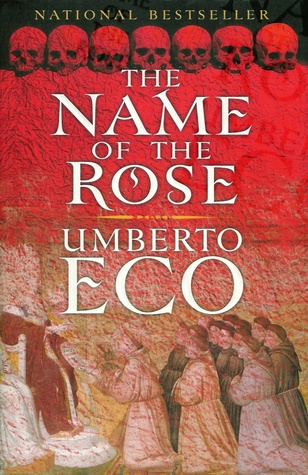
2) The Name of the Rose
Any reader of this medieval whodunit would fancy a jaunt through this library. It sits in a fortified tower of the Abbey in the form of an impossible labyrinth which only the librarian and his assistant may enter. Other monks must send requests for the books they wish to read, which are only granted if the librarian thinks they're justified. Needless to say, he wields quite a bit of klout.
But libraries from fantasy stories may be some of the most appealing to our curiosity and wonder.
3) Phantastes
This library in George MacDonald's wordy classic is one I'd love to visit if I could be sure to get hold of the right books. The hero, Anados, discovers that they draw you into their pages so that all of your five senses feel as if they're experiencing exactly what you're reading about. That takes interactive books to whole new level. (Click for more about this classic)
4) The Hogwarts Library
 It's located off a corridor on the first floor, and contains thousands of shelves of magic books for students to borrow, under the watchful eyes of Madam Pince. Only the Restricted Section is off bounds, especially to younger students, with the rare and dangerous secret knowledge it holds. It's the only spot in school which ever tempts Hermione Granger to break the rules, which she does whenever something really important needs to be researched. Anyone sneaking around in there without permission needs to handle the books very carefully, since some of them are jinxed with spells that might make them snap or scream.
It's located off a corridor on the first floor, and contains thousands of shelves of magic books for students to borrow, under the watchful eyes of Madam Pince. Only the Restricted Section is off bounds, especially to younger students, with the rare and dangerous secret knowledge it holds. It's the only spot in school which ever tempts Hermione Granger to break the rules, which she does whenever something really important needs to be researched. Anyone sneaking around in there without permission needs to handle the books very carefully, since some of them are jinxed with spells that might make them snap or scream.
5) Mr Norrell's Library
The wily old owner of this library has made sure it's one of a kind. Determined to be Britain's only magician, Mr Norrell has taken pains to acquire all the out-of-print old books of magic he can get his greedy hands on. There are thousands of rare gems, and nobody else can even find their way to his library, let alone read anything, since he's jinxed the route with several false passages. Norrell's frustrated former student Jonathan Strange gets his own back in a fit of temper by re-arranging the passages so that for one terrifying hour, Norrell can't find his way to his own library. (Here is my review.)
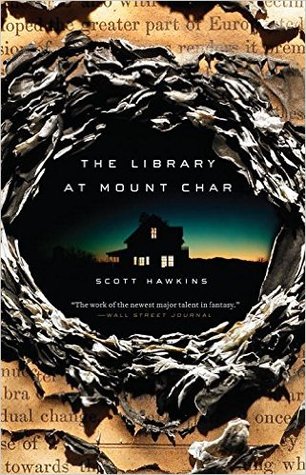
6) The Library at Mount Char
It's a sinister tale in which a ragtag group of vulnerable orphans are adopted by a formidable being known to them as 'The Father.' His library holds the secret to his power, and he forces the children to become specialist librarians, each mastering one particular area of knowledge.
7) Library of Souls
 It's not books stored in this creepy subterranean library but human souls in jars, for other Peculiars to borrow in their time of need. The evil megalomaniac Caul wants nothing more than to get his hands on them all for himself, and forces our hero Jacob Portman into the library with him, since Jacob's special gift means he's the only one able to see the jars. (My review is here.)
It's not books stored in this creepy subterranean library but human souls in jars, for other Peculiars to borrow in their time of need. The evil megalomaniac Caul wants nothing more than to get his hands on them all for himself, and forces our hero Jacob Portman into the library with him, since Jacob's special gift means he's the only one able to see the jars. (My review is here.)8) The Librarian
Perpetual student Flynn Carsen has no idea what he's in for when he applies for a job at the Metropolitan Public Library. He's hired to protect several magical and historical artifacts such as Pandora's Box and Excalibur. It's perhaps your ultimate responsible job. A serious theft has left Flynn dashing desperately across the world, relying on his extensive book knowledge to save the day.
9) The Time-Traveler's Wife
Henry deTamble is a librarian who has a genetic condition which forces him to travel to different stages of his own life, leaving just a pile of the clothes he was wearing behind him. Luckily for him it never seemed to happen in the library while he was making a presentation to special interest groups. (Here is my review.)
Here's a couple of appealing stories that feature quite normal libraries, and the impact they have on the characters. Some of them are more obscure stories which I've enjoyed.
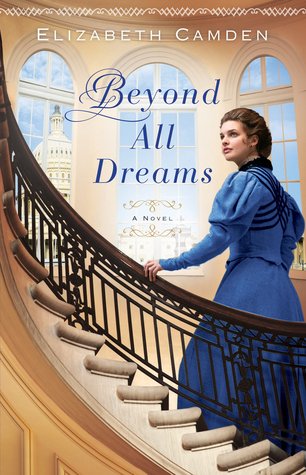 10) Beyond all Dreams
10) Beyond all DreamsThis is a sensitive story about a research librarian named Anna, who archives maps. She notices some inconsistencies in a document about a shipwreck on which her father supposedly drowned. Making a report turns out to open a tinder box of nasty facts which people in high places would have preferred to keep hushed up. Anna's experience proves that on rare occasions, a librarian may actually be a hazardous occupation. (I've reviewed it here)
11) Wonderland Creek
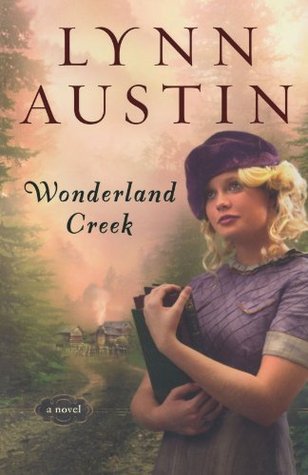 Another heroine who made a similar discovery was Alice, a timid bookworm who hated taking risks. But when her library job forces her to deliver some boxes of donated books to a tiny hillbilly community, she's roped into being a mobile librarian who must visit potentially cutthroat and dangerous places on her rounds.
Another heroine who made a similar discovery was Alice, a timid bookworm who hated taking risks. But when her library job forces her to deliver some boxes of donated books to a tiny hillbilly community, she's roped into being a mobile librarian who must visit potentially cutthroat and dangerous places on her rounds.12) Pollyanna's Western Adventure
It's one of the charming adventures of glad girl Pollyanna which has sadly gone out of print, but there are probably still a few old volumes floating around. One is in my bookshelf, since my mother owned it as a girl. Pollyanna's little family is forced to go and live out in the sticks for her husband Jimmy's job as an engineer. She gets the opportunity to set up a lending library from the books she brings from home. The locals are always glad to see her coming, and no wonder. A smiling, friendly face combined with a load of books would have to be a winning combination.
13) The Ladies of Ivy Hill
In this village chronicle, a small lending library is set up by Miss Rachel Ashcroft. She's never been a reader, but all her father has left her in his will is his huge collection of books, so she feels forced to make the best of an undesirable situation. Of course we book lovers know that having lots of books around isn't a bad thing at all, and wait for her to find out too. (See here for here.)
14) All of a Kind Family
This vintage kids' series is about five young sisters ranging in age from 4 to 12. When Sarah, the middle girl, loses a library book, she and her sisters go cringing to the librarian, expecting her to be a dragon who will severely punish them. Instead, they're relieved by her kindness and come out with a renewed zeal to borrow books.
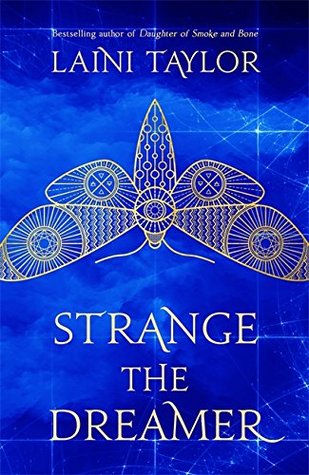 I've saved one of my favourites until last, because it pulls together such a lot of elements that make library stories so great. It's a fantasy novel which makes the benefits of a good library clear for anyone who has the curiosity and nous to use it well.
I've saved one of my favourites until last, because it pulls together such a lot of elements that make library stories so great. It's a fantasy novel which makes the benefits of a good library clear for anyone who has the curiosity and nous to use it well. 15) Strange the Dreamer
The hero is surely one of the cutest young librarians to be found in any story. Lazlo Strange was a 13-year-old war orphan apprenticed to work at the Great Library in the Kingdom of Zosma, which is described as a haven for poets, astronomers and every shade of thinker between. The wise senior librarian Master Hyrrokkin said, 'The library knows its own mind. When it steals a boy we let it keep him.' A few years later when he's grown up, the sweet little bookworm must convince a mighty warrior that his own nerdy, bookish knowledge will come in handy for a great expedition. (And here is my review.)
I know my list of literary libraries is probably just scratching the surface, so if I've overlooked any good ones you can think of, please add them in the comments.
Subscribe to:
Posts (Atom)
